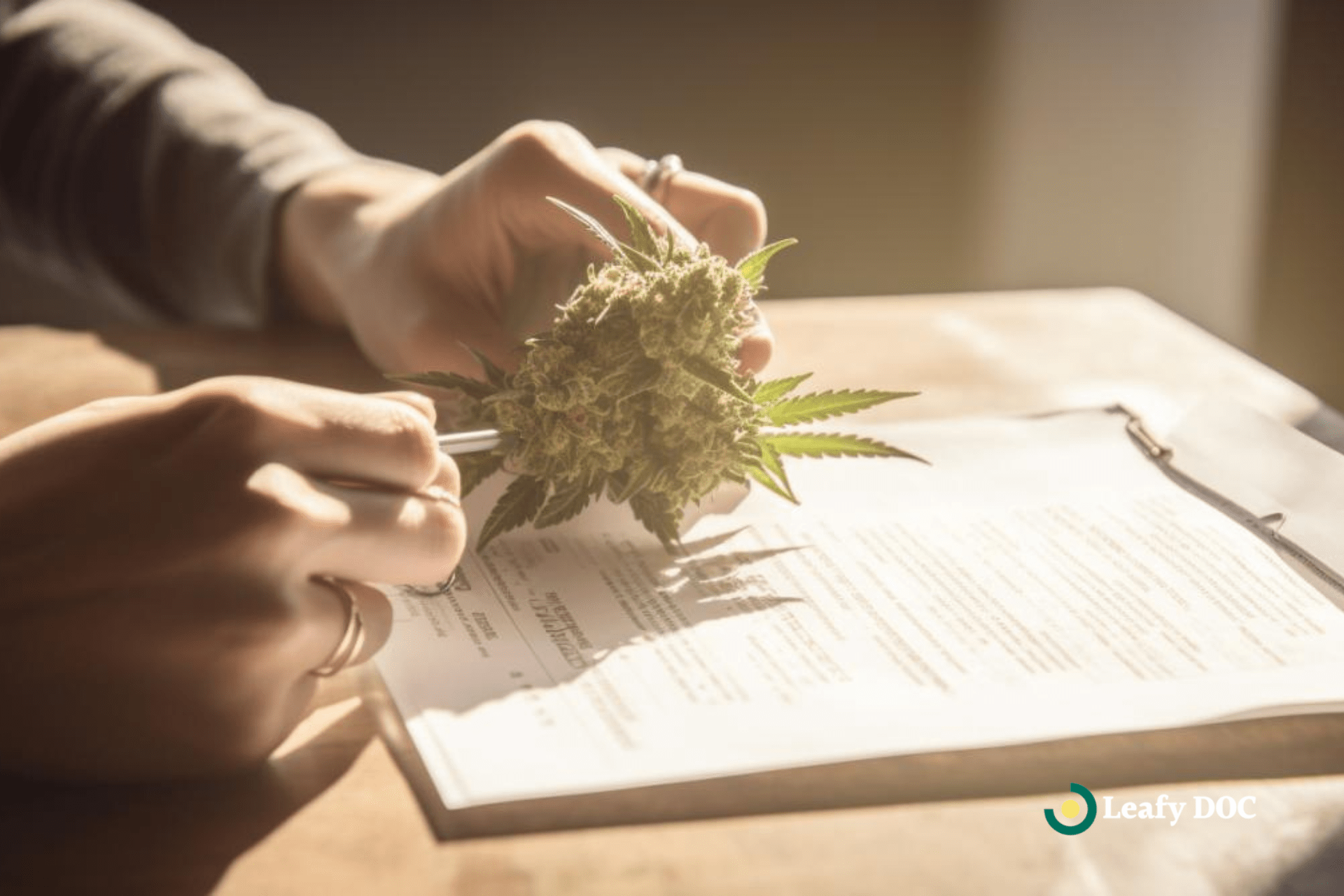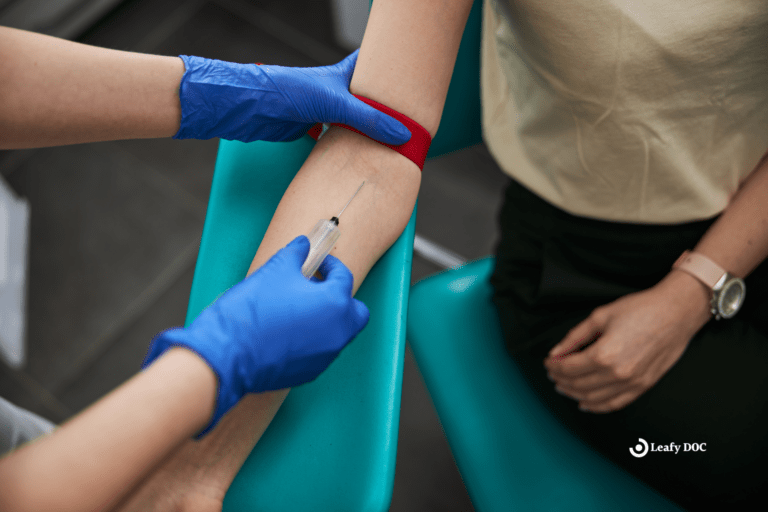Understanding The Application Process For A Medical Marijuana Card
by Haley Mills · June 15, 2024
Get relief with a medical marijuana card! Learn how to easily apply and navigate the application process in this step-by-step guide. Click now for all the information you need!

Understanding the MMJ application process is crucial for those who desire for freedom and are seeking alternative treatment options for their medical conditions.
Firstly, you need to familiarize yourself with the qualifying medical conditions that allow you to apply for a medical marijuana card. Conditions such as chronic pain, anxiety, epilepsy, and cancer are just a few examples of the many ailments that may qualify you for a card.
Once you have determined that you have a qualifying condition, you must gather the necessary documentation to support your application. This may include medical records, prescriptions, and any other relevant documents that prove your condition and the need for medical cannabis as a treatment option.
Now that you have your documentation in order, the next step is to find a licensed medical marijuana doctor who can evaluate your condition and provide you with a recommendation for a medical marijuana card. Choose a reputable doctor who specializes in medical cannabis and can guide you through the process.
Once you have received your recommendation, you can then proceed to submit your application to the appropriate government agency in your state. This may require filling out forms, paying a fee, and providing additional documentation as required.
After submitting your application, the waiting game begins. The approval process may take some time, but once you receive your medical marijuana card, you are now free to explore the therapeutic benefits of medical cannabis.
With your card in hand, you can visit licensed dispensaries and purchase the products that suit your needs. Remember, this card is not just a piece of paper – it represents your freedom to choose alternative treatments and take control of your health.
Qualifying Medical Conditions
You may think that qualifying medical conditions for a medical marijuana card are limited to serious illnesses like cancer, but you’ll be surprised to know that conditions like chronic pain and anxiety also make the cut.
The truth is that the medical marijuana industry has come a long way in recognizing the potential benefits of cannabis for a wide range of conditions.
So, if you’ve been suffering from chronic pain that just won’t let up or anxiety that keeps you from living your life to the fullest, obtaining a medical marijuana card could be the key to unlocking a world of relief and freedom.
Imagine a life where you no longer have to rely on prescription painkillers that come with a laundry list of side effects. With a medical marijuana card, you have the opportunity to explore a natural and potentially safer alternative.
Whether you’ve been dealing with arthritis, migraines, or any other condition causing chronic pain, medical marijuana has shown promise in providing much-needed relief. Similarly, if anxiety has been holding you back from enjoying life’s simple pleasures, cannabis might be the answer you’ve been searching for.
Gathering Necessary Documentation
It’s crucial to collect all the required paperwork to gather the necessary documentation. This will ensure a smooth and efficient application process for your medical marijuana card.
Here are the key documents you’ll need to gather:
- Medical records: Gather relevant medical records supporting your qualifying medical condition. This could include doctor’s notes, test results, and other documentation proving your condition.
- Proof of residency: You’ll need to provide proof that you are a resident of the state where you are applying for a medical marijuana card. This can be a driver’s license, utility bill, or any other official document that shows your current address.
- Identification: You’ll need to provide a valid form of identification, such as a driver’s license or passport, to prove your identity.
- Application form: Fill out the application form provided by the state’s medical marijuana program. Make sure to provide accurate and complete information to avoid any delays in the application process.
Finding a Licensed Medical Marijuana Doctor
When searching for a licensed medical marijuana doctor, finding the right one is like finding a needle in a haystack. With the growing acceptance and popularity of medical marijuana, there are now countless doctors claiming to offer these services. However, not all of them are legitimate or knowledgeable about the benefits and risks of medical marijuana. To help you navigate through this overwhelming process, here are some tips on finding a licensed medical marijuana doctor:
| Tip | Description |
|---|---|
| 1 | Research reputable sources: Start by researching reputable sources such as state medical marijuana websites, patient advocacy groups, or trusted medical associations. These sources often provide lists of licensed doctors who specialize in medical marijuana evaluations. |
| 2 | Read reviews and testimonials: After finding potential doctors, take the time to read reviews and testimonials from previous patients. This will give you an idea of their professionalism, knowledge, and bedside manner. Look for doctors who have positive reviews and a track record of helping patients effectively manage their medical conditions. |
| 3 | Consult with multiple doctors: It’s always a good idea to consult with multiple doctors before making a decision. This will allow you to compare their recommendations, pricing, and overall comfort level with each doctor. Remember, finding the right doctor is crucial for a successful application process and ongoing treatment. |
Submitting the Application
Once you’ve gathered all the necessary documents, it’s time to submit your application for a medical marijuana card. This is an important step towards gaining access to the relief and freedom that medical marijuana can provide.
Here’s what you need to know about the application process:
- Completing the application form: The first step is to fill out the application form provided by your state’s medical marijuana program. Make sure to provide accurate and up-to-date information, as any mistakes or discrepancies could delay the processing of your application. Remember, this is your opportunity to showcase why you’re seeking a medical marijuana card, so be sure to provide detailed information about your medical condition and why you believe medical marijuana would be beneficial for you.
- Attaching supporting documents: Along with the application form, you’ll need to attach certain supporting documents. These may include a copy of your valid government-issued ID, proof of residency, medical records or a doctor’s recommendation, and any other required documentation specified by your state’s program. Be sure to review the application guidelines carefully to ensure you’ve included all the necessary documents.
- Submitting the application: Once you’ve completed the application form and gathered all the required documents, you can submit your application. Most states offer online submission options, which can be convenient and efficient. However, if online submission isn’t available, you may need to mail your application to the designated address. Regardless of the submission method, be sure to keep a copy of your application and any supporting documents for your records.
Approval and Obtaining the Medical Marijuana Card
Getting approved for and obtaining your medical marijuana card is a straightforward and rewarding experience. Once your application’s been reviewed and approved by the relevant authorities, you’ll receive your medical marijuana card in the mail.
This card is your ticket to accessing the medicinal benefits of marijuana and enjoying the freedom to use it as a treatment option for your condition.
With your medical marijuana card in hand, you’ll have the ability to visit licensed dispensaries and purchase the products that best suit your needs. These establishments offer a wide variety of marijuana strains, edibles, and other products, ensuring that you have plenty of options to choose from.
The knowledgeable staff at these dispensaries can also provide guidance and recommendations based on your specific condition, helping you make informed decisions about your treatment.
Obtaining your medical marijuana card not only grants you access to the medicine you need, but it also provides a sense of empowerment and freedom. It allows you to take control of your own health and well-being, choosing a natural and alternative treatment option that may have fewer side effects than traditional pharmaceuticals.
Frequently Asked Questions
How long does it typically take to receive a medical marijuana card after submitting the application?
Ready to experience the sweet taste of freedom? Once you submit your application for a medical marijuana card, it typically takes a few weeks to receive it. Hang in there, and soon you’ll be enjoying the benefits!
Can I use my medical marijuana card in other states?
Yes, you can use your medical marijuana card in other states that have legalized it. This gives you the freedom to travel without sacrificing your access to the relief and wellness you deserve.
Do I have to renew my medical marijuana card every year?
Yes, you’ll need to renew your medical marijuana card every year. It’s like a passport to your freedom and access to the healing powers of cannabis. Don’t let it expire and miss out!
Are there any age restrictions for obtaining a medical marijuana card?
Yes, there are age restrictions for obtaining a medical marijuana card. The minimum age varies by state, but you must be at least 18 or 21 years old, depending on where you live.
Will my employer be notified if I have a medical marijuana card?
No, your employer will not be notified if you have a medical marijuana card. Your medical information is protected by privacy laws, and it is illegal for your employer to discriminate against you based on your card status.
Last Updated: August 8, 2024
Get Approved for Your Medical Marijuana Card in Minutes!

Get Your Medical Card
Connect with a licensed physician online in minutes

Like This Article?
Share with your friends
Table of Contents
Keep Reading
-
Step-by-Step Guide to Get Your Free Medical Marijuanas Card MO
Learn how to apply for a free medical marijuanas card mo with our comprehensive step-by-step guide.
-
Can You Donate Blood If You Smoke Weed?
Curious about donating blood while enjoying weed? Find out the truth and debunk myths here. Click now to learn if you can donate blood if you smoke weed and clear up any misconceptions!
-
Get Answers To Frequently Asked Questions About Medical Marijuana Dispensaries In PA
Discover everything you need to know about PA dispensaries! Get answers to your burning questions and make the most of medical marijuana. Don’t miss out – click here now!



